University of Maine Cooperative Extension Hancock County 2019 Annual Report
ANNUAL REPORT
Our Annual Report features highlights of our educational programming
June 30, 2019 – July 1, 2020
Office of the Dean of Extension

Welcome to the University of Maine Cooperative Extension! We are located across the state in 16 county offices, research farms, 4-H camps and learning centers, and online. We are the largest outreach component of the University of Maine and reach more Maine people than any other entity within the seven campus University of Maine System. Our work is focused on helping Maine communities thrive and we do so focusing on two areas of excellence–the Maine Food System and 4-H. UMaine Cooperative Extension conducts the state’s most successful out-of-school youth education program through 4-H, empowering young people to reach their full potential. Extension also helps support, sustain, and grow the food-based economy across the entire state of Maine. In addition, we partner with other organizations and programs to provide additional educational opportunities to a diversity of audiences across this state.
UMaine Cooperative Extension is determined to make a positive difference in our areas of excellence and beyond for the citizens of Maine. Explore our website, visit a county office, and contact our enthusiastic workforce.
— Hannah Carter, Dean
HANCOCK County Extension Association
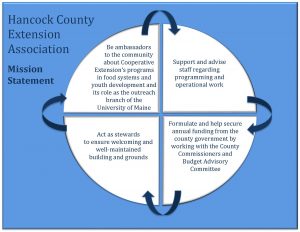
| President | Greg Veilleux – Bar Harbor |
| V. President | Dotty Caldwell – Penobscot |
| Treasurer | Mary Jude – Lamoine |
| Secretary | Jennifer Jones – Southwest Harbor |
| Members | Rachel Emus – Blue Hill |
| Jane Freeman – Ellsworth | |
| Craig Gladstone – Bar Harbor | |
| Betty Robshaw – Bucksport | |
| Dwight Sargent – Lamoine | |
| Mary Soper – Orland |
HANCOCK County Staff
| Marjorie Peronto – Extension Educator | marjorie.peronto@maine.edu |
| Suzanne Baez – Administrative Support Supervisor | sue.baez@maine.edu |
| Joyce Fortier – Administrative Specialist | joyce.fortier@maine.edu |
| Zabet NeuCollins – Community Educational Specialist / 4-H | zabet.neucollins@maine.edu |
| Carla Scocchi – 4-H Professional | carla.scocchi@maine.edu |
| Debra Spurling – Community Education Specialist / Eat Well | debra.spurling@maine.edu |
COVID-19 INFORMATION AND SUPPORT FOR MAINE GARDENERS
To address the increased demand for gardening education and provide additional support for beginning gardeners, UMaine Extension’s Home Horticulture team developed new programs and offered traditional programs in new ways. Opportunities for Hancock County residents have increased significantly with these statewide initiatives.
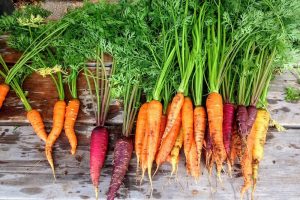
Victory Gardens for ME instructional video series:
This series of ten instructional videos helps Mainers grow their first vegetable garden. Series includes: Vegetable Gardening, Where to Begin; Planning Your Garden; Preparing your Garden Soil; Get Planting; Managing Weeds; How to Water Your Garden; What’s Wrong with my Plant; What to do With Your Harvest; I Dig Pain-Free Gardening, and Preparing Your Garden for Winter. Over 3,000 views in two months.
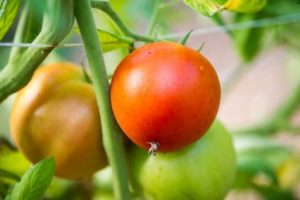
Garden Chats: Growing from the Ground Up
From April through June 2020, a series of thirty ZOOM lessons on featured horticulture topics were offered for free. The purpose was to keep people communicating and learning about horticulture, and provide a forum for them to interact during the period of self-isolation at home. Each remote session was attended by between 40 and 80 gardeners.
Virtual Office Hours
Despite temporary Extension building closures during the COVID-19 pandemic, we were still fully open for business, operating remotely from our homes. Extension staff made themselves available to customers on a daily basis with virtual office hours. Clients could access an Extension Educator any day of the week via Zoom.

Grow with Good Morning Maine: WVII Channel 7 News
Throughout the 2020 growing season, Extension Educator Marjorie Peronto conducts weekly segments for beginning gardeners on growing your own food.
Free Seed and Seedling Distribution to Food Insecure Families
Cooperative Extension coordinated the distribution of over 1,000 vegetable seeds packets (donated by local businesses) and 200 tomato seedlings (grown by Extension staff and volunteers) to Hancock County families facing food insecurity.
COUNTY HIGHLIGHTS – MAINE FOOD SYSTEMS
COVID-19 INFORMATION AND SUPPORT FOR MAINE FARMERS
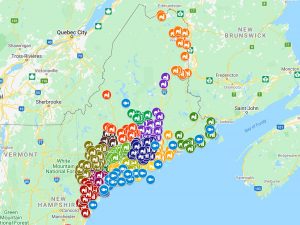
UMaine Extension staff teamed with numerous partnering agencies to create extensive online resources to support farmers during COVID-19. Opportunities for Hancock county residents have increased significantly with these statewide programs.
Online Maine Farm and Seafood Products Directory
Cooperative Extension created an interactive map and database of Maine farms for consumers to connect directly with producers and learn about their products, pick-up options, and safety procedures during the COVID-19 outbreak. Twenty-three Hancock County Farms have benefited by being listed in this directory.
Best Management Practices and Support for Nurseries, Farm Stands and Farmers Markets During COVID-19
Extension quickly created recommendations and webinars for safely managing direct marketing, alternative (e-commerce) marketing methods, and webinars for farms pursuing social media and digital marketing methods.
Best Management Practices and Support for U-Pick Farms During COVID-19
Cooperative Extension quickly developed safety guidelines and resources for Pick-Your-Own Operations and consumers.
Food Safety Standard Operating Procedures for Farms During COVID-19
Extension website provides recommended procedures for farm and food safety, guidelines for agricultural employers and workers, sources of PPE and farm disinfecting supplies.
Farm Financing, Employment and Legal Issues During COVID-19
Extension is providing updates and web links to grants, loans, food and disaster assistance programs, and legal information for farms.
Throughout the pandemic, UMaine Extension’s labs continue to diagnose plant diseases, insects, ticks, veterinary issues and soil analyses.
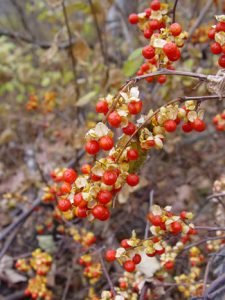
Community Garden Guidelines in a Time of Social Distancing
Cooperative Extension staff worked with the CDC and partnering agencies to develop safety protocols and resources for Maine’s Community Gardeners.
This program matches Master Gardener Volunteers with new gardeners in order to provide virtual technical assistance and encouragement throughout the season.
Ask an Expert Online Garden Q and A
With years of experience in home horticulture and commercial agriculture, Extension experts fielded gardeners’ questions, helping them achieve successful harvests and use gardening as a vehicle to develop communities. Over 200 garden related questions addressed.
Spring Gardening Webinars – Invasive Plant and Gardening for Wildlife
Extension staff created two online short courses on identifying and managing invasive plant species, gardening for wildlife, and restoring native habitat.
Of a total of 434 participants, 53 were from Hancock County.
Master Gardener Volunteers Training
The 2020 Hancock County Master Gardener Volunteers training was interrupted mid-way through by the COVID-19 pandemic. We quickly transitioned the second half of the training to remote instruction via Zoom. Sixteen of the seventeen MGV students completed the training despite the abrupt shift in mode of delivery.
MGVs are now volunteering from the safety of their homes, growing extra produce for Maine Harvest for Hunger, creating educational presentations and fact sheets, writing for our online newsletter Maine Home Garden News, and mentoring beginning gardeners.
ADDRESSING FOOD INSECURITY
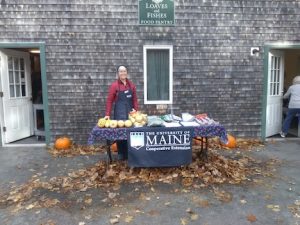
In 2019, twelve Extension Eat Well Volunteers continued their interactive demonstrations in four Hancock County food pantries (Ellsworth, Bucksport, Mariaville and Southwest Harbor). Our goal is for food pantry clients to consume more fruits and vegetables and develop stronger food self-sufficiency skills. Eat Well Volunteers taught food preparation and food safety skills while distributing fresh produce grown and gleaned by Extension staff and Master Gardener Volunteers. Eat Well Volunteers had a total of 1,178 educational interactions with food pantry clients and gave 445 hours of volunteer service, valued at $ 11,316
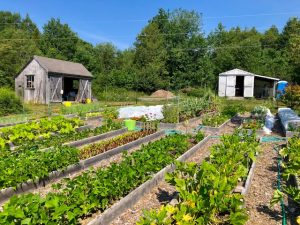
Cooperative Extension’s Master Gardener Volunteers teamed together to grow fresh vegetables for hunger relief in community gardens in Hancock, Ellsworth, Eastbrook, Mount Desert, Seal Cove and Cherryfield. In 2019, for our ninth consecutive year, we gleaned surplus apples from Johnston’s Apple Orchard in Ellsworth, thanks to the generosity of Brett and Doris Johnston. Six tons of fruits and vegetables were distributed to 27 Hancock County food pantries, community meal sites, homeless shelters and limited income housing facilities.
Hancock County Food Security Network Addressed Regional Issues
Cooperative Extension and Healthy Acadia bring together representatives from food security organizations throughout Hancock County. The Hancock County Food Security network orchestrated our ninth annual Countywide Food Drive during the month of March, 2020. Despite being interrupted by the coronavirus pandemic, the team raised $37,600 for hunger relief in Hancock County, which was divided among eighteen food pantries, community meal sites and school backpack programs.
AGRICULTURE AND HORTICULTURE SKILLS DEVELOPMENT
Downeast Agriculture Conference, January, 2020
Cooperative Extension brought together 70 farmers from seven counties for the first Downeast Agriculture Conference, held in Machias. The conference focused on overcoming challenges in Downeast Maine, including a farmer panel discussion and highlights of farm diversification opportunities such high tunnel vegetable production, seaweed, shellfish and baitfish production and agri-tourism. Fourteen Hancock County farms were represented.
Maine Wild Blueberry Conference, February, 2020
In February, 2020, Cooperative Extension gathered 102 lowbush blueberry growers from fourteen counties to share University blueberry research updates and workshops on production and marketing, including creating value added blueberry products. Thirteen Hancock County blueberry growers participated.
Learn More about our Maine Wild Blueberry program in Maine.
Sustainable Landscaping Education
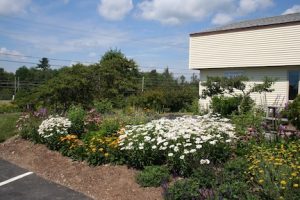
Hancock County Master Gardener Volunteers developed and maintained four public garden spaces using native plants, pollinator plants, and low impact landscaping techniques. Public workshops in sustainable landscaping were offered from these sites. Sites include:
– Hancock County Extension Office Native Plant Landscape, Ellsworth
– Dunstan’s Creation Garden, Ellsworth
– Native Gardens at Bagaduce Music Lending Library, Blue Hill
– Charlotte Rhoades Park Butterfly Garden, Southwest Harbor
Local Horticulture Hotline for Hancock County Residents
Extension Horticulture Educator Marjorie Peronto and coworkers fielded 228 inquiries from Hancock County residents regarding pest management, soil test interpretation, food production, ornamental gardening, composting, pesticide safety and much more. 593 soil tests were performed.
COUNTY HIGHLIGHTS – 4-H YOUTH DEVELOPMENT

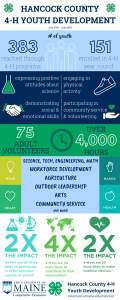
4-H is the positive youth development program of the University of Maine Cooperative Extension. Hancock County 4-H is focused on educating and empowering youth through hands-on and community-based experiences, with self-directed learning and collaborations. 4-H youth acquire knowledge and skills that will contribute to leadership and the ability to succeed now and in the future. The four “H’s” stand for Head, Heart, Hands, Health, and represents the foundation for positive youth development found in all 4-H programs. The 4-H model for Positive Youth Development is successful because of its focus on positive and sustained relationships between youth and adults, activities that build important life skills, and opportunities for youth to use these skills as participants and leaders in valued community activities.
Serving Hancock County Youth
- 151 youth enrolled in 4-H year-round
- 75 adult volunteers to support them
- 383 youth reached through Hancock County 4-H programs and events this year (July 2019 – July 2020)
INNOVATIVE 4-H PROGRAMMING DURING COVID-19
- 4-H Summer Learning Series: over 50 online and offline workshops to choose from during July and August!
- 4-H Learn at Home Website: An extensive collection of educational resources to use during school closures
- Maine 4-H Fridays: a video series of hands-on activities that can be done at home
- Growing Maine Gardeners: Youth gardening video series.
- QuaranTEEN Virtual Science Cafes: Connecting teens to interesting research and faculty at Umaine
- Wednesdays in the Woods with Tanglewood 4-H Camp & Learning Center: a video series of outdoor activities that can be done at home
Visit our 4-H website to learn more about these and other 4-H opportunities in Hancock County:
https://extension.umaine.edu/hancock/4h/programs/ Statewide: https://extension.umaine.edu/4h/
 Hancock County 4-H At-Home Jamboree:
Hancock County 4-H At-Home Jamboree:
Delivering 28 experiential learning kits direct to homes.
100% of youth respondents reported that the 4-H At-Home June Jamboree program gave them the opportunity to explore something they really cared about while they were home during COVID-19. June 2020.
We asked participants to document their At-Home Jamboree activities and submit photos with captions. View 4-H At Home June Jamboree wrap up and celebration.

HANCOCK COUNTY 4-H PROGRAM HIGHLIGHTS
Workforce Development 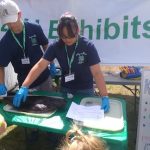
Aquaculture Internship Program: 4-H Aquaculture Interns teaching the public at the Blue Hill Fair about the anatomy of Halibut, a fish they helped raise at the Center for Cooperative Aquaculture Research. August 2019.
Outdoor Leadership
Peninsula Explorers 4-H Club learning about ice fishing, March 2020
Community Service
Jolly Juniors 4-H Club completing a roadside cleanup in the midst of COVID-19 school closures. Each household covered a different stretch of road to maintain distance, but still accomplish a project together! 4-H’ers in this photo are members of the same household. May 2020.
STEM
4-H Aquaponics Projects – This year, Hancock County 4-H partnered with two local schools and Camp CaPella to provide Aquaponics project-based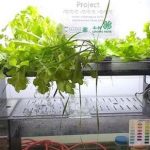 learning opportunities. In Summer 2020, we are offering an At-Home Aquaponics Project program for youth and their families through building their own aquaponics systems at home. These projects have been consistently popular with teachers, youth, and families and we hope to expand in the coming year.
learning opportunities. In Summer 2020, we are offering an At-Home Aquaponics Project program for youth and their families through building their own aquaponics systems at home. These projects have been consistently popular with teachers, youth, and families and we hope to expand in the coming year.
Reducing Summer Learning Loss
Summer of Science participants engineering their own “straw bridge” to hopefully hold a load of pennies! In an effort to reduce Summer Learning Loss, Hancock County 4-H partnered with Trenton Elementary School to deliver a series of weekly, hands-on STEM activities in summer 2019.
Entrepreneurship 
4-H Egg Business Project – Member, Ren S. (pictured here with his little sister), operates Fieldstone Farm where he sells his eggs directly to customers as well as at the Winter Harbor Farmers Market. Ren is mentored by 4-H Volunteer and SBDC Business Advisor, Shannon Byers.
Additional 4-H Programs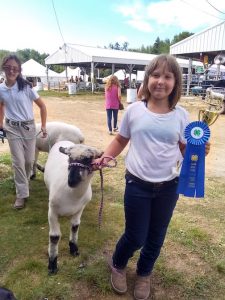
- 4-H Public Speaking
- Style Revue
- Photo Contest
- Community Service Projects
- Eastern States Exposition
- 4-H at UMaine
- Blue Hill Fair
Hancock County Extension Homemakers
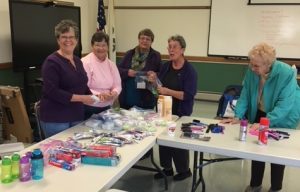
The UMaine Extension Homemakers in Hancock County donated 37 homemade items ranging from scarves to afghans, made 73 baked-goods and cooked 149 meals. They partook in 20 educational programs and tours, learning skills such as biscuit making, winterizing plants, lobstering 101, and discussing cultural and geographical places such as Peru and Wyoming. Although on hold since March, Homemakers are eager to get back together and work on projects that benefit the community.
STATEWIDE HIGHLIGHTS – Maine Food Systems
Supporting Maine’s Wild Blueberries
Relevance – Wild blueberries are a $250 million industry in Maine. Mummy berry and Botrytis flower blight can be serious diseases in wild blueberries that can greatly decrease yield when they occur. Mummy berry can result in complete crop loss if not effectively controlled. Botrytis can kill off 30% of flowers during bloom, and frost during bloom also can greatly decrease yield. Maine’s 510 blueberry growers need accurate weather and disease risk information, and those who use fungicides need timely information on when they should apply fungicides for optimum efficacy. Timely applications of fungicides provide improved control of mummy berry and Botrytis. Avoiding unnecessary fungicide applications also saves growers’ money and prevents adding unnecessary pesticides to the environment.
Response – Extension has a network of 15 Internet connected weather stations in low bush blueberry fields. From the weather data and field conditions, we provide growers with biweekly reports on infection risk during mummy berry season and make recommendations on effective times for fungicide applications. In 2019, Extension provided growers with a new weather app developed with AgriNet. This web-based app is available on mobile phones and provides current information for each weather station, and indicates when disease events have occurred. Future additions to the app will include alerts for frost events and inclusion of growing degree day models for important blueberry life stages or pests.
Result – As a result, more growers can quickly obtain information about their fields for weather conditions and disease risks. Growers report substantial savings by avoiding unnecessary applications of fungicides to control mummy berry disease.
Supporting Food Producers with Food Safety
Relevance – The 2011 Food Safety Modernization Act (FSMA) was a significant change to food safety regulations, introducing a proactive rather than reactive approach to outbreaks. Two major rules impacted farmers and food businesses in Maine, and throughout the U.S. They are the Produce Safety Rule (PSR) and the Preventive Controls for Human Food Rule (PC). The overall goal of these rules is to make our food system safer. For produce farmers, the impact of the changes are the greatest, since this industry has not been regulated before. These farmers remain uncertain of how the regulations affect their work.
Response – In 2019, Extension provided three-day PC trainings to over 30 food producers in Maine and three seafood Hazard Analysis Critical Control Point (HACCP) courses with 60 seafood processors and one Meat and Poultry course with 23 participants. We have scheduled PSR training to over 200 farmers. In addition to these trainings, Extension provided one-on-one consulting and education for over 30 food producers, providing services ranging from facility design, sanitation, thermal process design/validation, and food safety plan guidance.
Result – As a result of participation in these FSMA trainings, over 60 food producers have implemented food safety plans. One company exemplifies the implementation of knowledge gained by participating in all three trainings and receiving one-on-one consulting. In the six years that Extension has been working with this company, they have grown from producing 200 units a week to over 8,000, and grown from 2 employees in 2012 to 12 full-time and 5 part-time employees in 2019. In 2020, they are planning to build a new building capable of producing over 20,000 units a week.
AgrAbility…Supporting Farmers of All Abilities To Remain Active on the Farm
Relevance – The average U.S. farmer is 58 years old, and farming is the sixth most dangerous job in America. An estimated 5,700 farmers, farm family members, or farm workers in Maine have a chronic health condition or disability, such as post-traumatic stress disorder, traumatic brain injury, or aging-related issues, such as arthritis or hearing loss. In addition to farmers, fishermen, forest workers, and migrant workers face similar challenges for remaining successful in production agriculture.
Response – Funded through USDA/NIFA, Maine AgrAbility helps Maine farmers, loggers and fishermen facing physical or cognitive challenges, to enhance their ability to farm and live independently, which improves their quality of life and economic sustainability. AgrAbility specialists assess issues and offer adaptive recommendations. They provide education about safe work methods and connect people with other resources through this nonprofit partnership between Extension and Alpha One. The program supports the capacity of health and agricultural professionals to provide assistance and services for farmers and farm workers with disabilities.
Result – Since the project began in 2010, Maine AgrAbility has provided technical information to over 800 farmers and conducted on-site assessments for over 100 agricultural workers. The diverse agricultural operations include dairy and livestock operations, Christmas tree farms, fruit orchards, agritourism, vegetable and maple syrup production, hay sales, managing woodlots and lobstering. A 2019 program evaluation suggests that participants experienced an increase in economic viability and sustainability, and that AgrAbility suggestions made their farm business more accessible, or using their existing resources differently allowed them to start building up their farm again into a viable and stronger business.
Recipe to Market Program: Growing Successful Food Entrepreneurs
Relevance – There has been a growing interest in value-added food production in Maine. From farmers looking to add value to their raw products, to Maine families interested in turning their favorite recipes into viable food businesses. In response to this growing demand, the University of Maine Cooperative Extension developed the Recipe to Market program in 2007, and has been offering it to statewide audiences annually ever since. The goal of the program is to help potential and existing food entrepreneurs acquire food science and business knowledge and skills to successfully bring a value-added food product to market.
Response – Since its inception, Extension has conducted 28 programs in 9 counties reaching 350 participants across the state. The program is offered in both multiple and single session formats and is designed to help participants understand licensing/regulations, processing/packaging, the specialty food industry and acquire business management knowledge and skills. The program is conducted by a multidisciplinary team of Extension faculty and covers topics such as: Introduction to Specialty Foods; Developing Your Product and Process; Business Realities; Marketing and a resource panel discussion.
Results – As a result of attending these educational programs, more than 90 percent of the participants surveyed indicated they improved their knowledge and skills and plan to adopt business and food processing/safety practices they learned during the program. Long-term survey results indicate that participants used the new knowledge they gained from attending Recipe to Market to make more effective business decisions, develop new food products, and write and revise business and marketing plans. The survey results also indicate that 27% of the Recipe to Market multi-session participants subsequently started food businesses. We estimate that 60 new value-added food businesses, generating $2.1 million in direct sales and employing 102 workers were started in Maine by the 221 people attending our Recipe to Market multi-session programs since 2007.
STATEWIDE HIGHLIGHTS — 4-H Youth Development
Fostering Positive Science Identities in Youth
Relevance – Educators in the United States, and in Maine, are continuing to work toward fostering interest and positive science identities in youth. They are also searching for ways to engage youth in local, place-based STEM activities, while using best practices for science learning and meeting local state and national standards. Youth enjoy and learn from experiential learning activities, particularly activities that have local and personal relevance and applicability. University researchers continue to explore ways to communicate research to public audiences, including K-12 age youth.
Response – As a way to bring UMaine research to youth audiences, Extension in 2014 developed 4-H Science Toolkits – curricula with associated materials available for loan from Extension offices. These toolkits are available to formal and informal educators at no cost, and the curriculum can be downloaded online. New toolkits have been recently developed or are being developed in mineralogy, meteorites, data science, forestry, solar energy, and aquaculture. Toolkits are standardized so that each serves a classroom group of 25 youth.
Result – The toolkit lending library has nearly 200 individual kits in almost 50 unique STEM subjects. In 2019, over 150 adults borrowed the 4-H Science/STEM toolkits, reaching over 2,000 youth with free hands-on STEM learning. This number is expected to grow with the availability of new toolkits and their use by 4-H STEM Ambassadors, UMaine researchers, and with many faculty adding funding for the creation of 4-H toolkits to their grant proposals. Outside sponsors have also sponsored 4-H toolkits, and the program is also part of a $20 million National Science Foundation grant to UMaine. By reducing a significant barrier for 4-H volunteers, club leaders, 4-H staff, and other educators, these STEM toolkits are bolstering STEM learning to Maine youth.
4-H Ambassadors Sparking Student Interest in STEM Careers
Relevance – Developing Maine youth’s STEM literacy is vital to ensuring that our state continues to thrive economically and socially. Given the remote and diverse communities where Maine youth live, informal education can help minimize inequities in rural youth STEM education and career pipelines. Future career opportunities in Maine will depend heavily on STEM skills, whether in the growing fields of healthcare and engineering, or in positions requiring technical skills, such as in construction and maintenance of transportation and energy systems.
Response – In 2019, the 4-H STEM Ambassador program staff trained 116 college students to develop and deliver informal STEM-based educational experiences. These volunteers committed 1,740 hours of time including training, preparation and program delivery. Through this program, youth ages 8-14 come to view these Ambassadors as mentors and leaders in their community while also developing skills in STEM through hands-on activities.
Result – The 4-H STEM Ambassador program continues to grow to reach more youth, and engage more UMaine System college students as we engage more partners in our efforts. In 2019, over 850 youth were engaged in at least 6 hours of hands-on science, engineering and mathematics. Youth participants agree they want to learn more about science and feel they are good at science, and feel college could be for them. Our 4-H STEM Ambassadors quickly develop confidence in their abilities as teachers and leaders in STEM education. Over the next twelve months we will extend the program to other higher education institutions in Maine. As part of a successful NSF grant to UMaine, expansion to select Maine Community Colleges will begin in 2020.
Childhood Obesity and EFNEP
Relevance – Nationally, 4.8 million (15.5%) children aged 10 to 17 are obese. Comparatively, Maine’s youth obesity rate is similar to the national rates at 14.9%. Annually, the United States spends $14 billion to treat childhood obesity, and obese children are almost three times more expensive for the health system than the normal weight child. Rising childhood obesity rates will continue to put a strain on current health promotion programs and continue to raise health care costs for the nation.
Response – In an effort to stop rising childhood obesity rates, UMaine Extension EFNEP implements direct education to Maine’s low-income children to improve their knowledge, behaviors, and attitudes related to improving diet quality, increasing daily physical activity, and using food resources management practices to learn how to plan and shop for healthy meals and snacks. Program outcomes are measured for all youth ages 5-18 using validated pre/post program surveys.
Result – In 2019, 2,056 youth participated in Maine EFNEP. Youth participated in an average of 6 classes over 2 months. Of the 2,056 youth that participated in EFNEP, 1,936 completed a pre and post survey. As a result of participating in EFNEP:
- 77% of youth improved their abilities to choose foods according to current Dietary Guidelines or improved nutrition knowledge.
- 38% of youth improved their daily physical activity practices.
- 53% of youth used safe food handling practices more often.
- 46% of youth improved their ability to prepare simple, nutritious, affordable food.
STATEWIDE HIGHLIGHTS —
Community and Economic Development
Helping Entrepreneurs in Pricing Skills
Relevance – Small businesses are very important to the economic vitality of Maine’s rural economy. More than 20% of the jobs in rural Maine are created by small-scale entrepreneurs. However, many of these entrepreneurs lack the business skills needed to successfully start-up and grow their businesses. Research shows that helping rural entrepreneurs improve their business skills will improve their chances for success. One of the most important business management skills is pricing. Yet, many small-scale entrepreneurs lack the knowledge and skills necessary to develop a profitable pricing strategy that can help ensure financial success.
Response – During the past year, the UMaine Extension conducted pricing workshops across the state, presented a pricing webinar in collaboration with the Maine Food Strategy, and taught a pricing seminar at a statewide conference for Maine entrepreneurs. The goal of this program was to help existing and aspiring Maine entrepreneurs improve their pricing knowledge and skills so they could develop profitable pricing strategies for their businesses. The program was conducted by Extension faculty and covered topics such as: key elements of pricing, pricing methods and models, pricing strategies, price elasticity of demand, profit margin and cost analysis.
More than 70 rural entrepreneurs from across Maine participated in this highly successful training. They included specialty food producers, farmers, craft artists, food retailers, environmental consultants, bookkeepers and other small rural businesses.
Result – As a result of attending these educational programs, Maine entrepreneurs improved their knowledge and skills of pricing, plan to adopt the pricing techniques they learned, and to set profitable prices for their products and services moving forward. Eighty-seven percent planned to set a new, more profitable, price for their product or service, and 97% planned to adopt the pricing techniques learned during the training. The average participant reported a 157% increase in their knowledge of pricing as a result of attending the workshops. Changes they plan to make within six months of the training included: incorporate the value or their time and profit into their pricing, conduct a thorough cost analysis, research the market before setting prices, and restructure their current pricing structure. Several workshop participants who attended follow-up one-on-one consultations said they subsequently created pricing strategies that led to increased profitability for their businesses.
Master Gardener Volunteers
Relevance – Successful school and community gardens are an important tool for enhancing public health and providing meaningful community engagement opportunities by increasing access to locally grown food, providing a safe space to connect with neighbors, and offering learning opportunities outside the classroom. Extension supports volunteer leaders and provides educational resources, which are key contributors to the success of these projects
Response – The Master Gardener Volunteers (MGV) Program provides participants with a minimum of 40 hours of in-depth training in the art and science of horticulture. Trainees receive current, research-based information from our educators and industry experts and are connected with service projects that match their interests, skill set, and availability. MGV coordinators facilitate relationships between MGV and community partners; assisting with needs assessment, program planning, risk management, and problem solving
Results – The MGV program provides opportunities for gardeners with all levels of experience to connect with meaningful service projects in their community. Of the 937 active MGV, 144 were trained in 2019. In total, they donated 33,500 hours to a variety of educational and food security projects throughout the state including support of: 53 community gardens 50 school gardens 57 demonstration gardens, and 66 youth programs involving 4,129 youth in horticulture activities this year. MGVs reported that they: increased community partnerships, assessed community needs and assets, engaged positively in their community, increased consumption of home-grown food, and developed new or expanded gardens. Many volunteers enter the MGV program with the goal of improving their gardening skills for their own personal benefit and leave surprised by how deeply involved and passionate they become about community projects.
Maine Harvest for Hunger: Mobilizing to Support Food Insecure Citizens
Maine has the highest rate of food insecurity in New England, and ranks 12th in the U.S. The USDA estimates 13.6 percent of Maine households, over 182,000 individuals, are food insecure. Twenty percent of children are food insecure. Twenty-three percent of seniors have marginal, low, or very low food security. Thirty-seven percent of food-insecure people do not qualify for food stamps or other government programs. It is especially challenging for food insecure people to afford high quality, fresh, nutritious food, and donations of fresh produce to Maine’s emergency food system has declined significantly in recent years.
Since 2000, UMaine Extension’s Maine Harvest for Hunger (MHH) program has mobilized gardeners, farmers, businesses, schools, and civic groups to grow, glean, and donate quality produce to distribution sites (pantries, shelters, community meals) and directly to neighbors in need, to mitigate hunger, improve nutrition and health, and help recipients develop lifelong positive nutritional habits. In addition, educational programs such as Hancock County’s Eat Well Volunteers, have focused on engaging food pantry recipients in learning appropriate methods of cooking and using fresh produce, and state-wide Extension programs help teach Mainers to grow more of their own fresh garden produce.
Since 2000, MHH participants have distributed over 3 million lbs. of food to citizens grappling with hunger. In 2019, donations of over 193,000 lbs. of fresh produce from over 120 Maine farms went to 207 hunger alleviation distribution sites. A corps of 365 volunteers and 8 corporate partners from 12 counties logged over 6,000 hours, and the value of the produce is estimated at over $327,000. Now in its 20th season, MHH has continued to improve the efficiency of supplying fresh produce to food pantries across Maine through building partnerships. For example, through MHH volunteer planning and communications, several food pantries are now sending trucks and vans directly to the farm where gleaning is taking place.
Maine has approximately 130 community gardens and many of them are supported by Extension staff and Master Gardener Volunteers. As a result, more than 30 of them now have added an MHH area to their community garden and have contributed almost 20,000 lbs. of our 2019 totals. In Penobscot County, volunteers anonymously sponsor food insecure families by collaborating with the Maine Family Institute to distribute fresh produce to the families, which has resulted in their increased consumption of fresh fruit and vegetables.
FINANCIAL
University of Maine Cooperative Extension Support for HANCOCK County
| HANCOCK County | CY2019 |
| Local Salaries and Benefits | 266,606 |
| Prorated Support from UMaine* | 431,143 |
| Computer Equipment and Networking | 705 |
| Statewide Animal Diagnostic Lab | 16,648 |
| Marketing, Publications, Video | 1,906 |
| Local Programming Supplies & Expenses | 5,838 |
| Postage | 997 |
| Telephone | 432 |
| Travel | 8,874 |
| TOTAL | 733,148 |
| * Prorated support from UMaine reflects travel, postage, telephone, computer equipment & networking, salaries & benefits for administrative and state-wide staff. | |
Without statewide support, UMaine Extension would not be present in your county. Funds for projects are provided through the University of Maine, Federal Formula Funds, grants, contracts, and fees. Dollars from other sources support salaries and benefits for Extension specialists, county educators, Extension administration, computer equipment and networking, publications, postage, telephone, and travel.
Statewide Extension Funding
As a unique partnership among federal, state and county governments, UMaine Extension uses funding from Maine counties and the University to match and leverage support from the United States Department of Agriculture, other federal grantors, state agencies and private foundations. Each county UMaine Extension office is also part of a statewide organization and the national Extension system.
Hancock county tax dollars support the UMaine extension with physical office space, support staff salaries, office supplies, equipment and some programming expenses. The 2019 support from Hancock County was $70,000.
